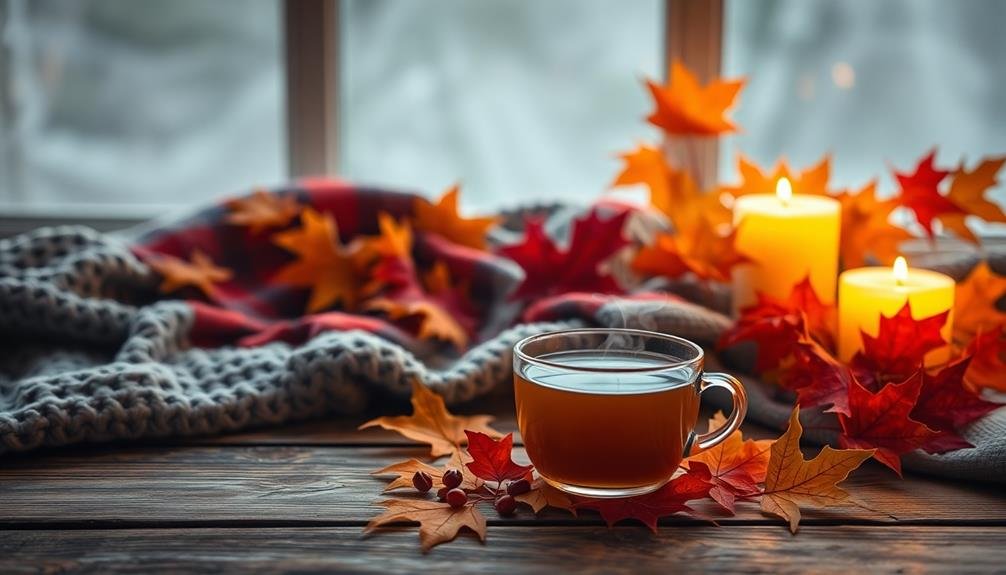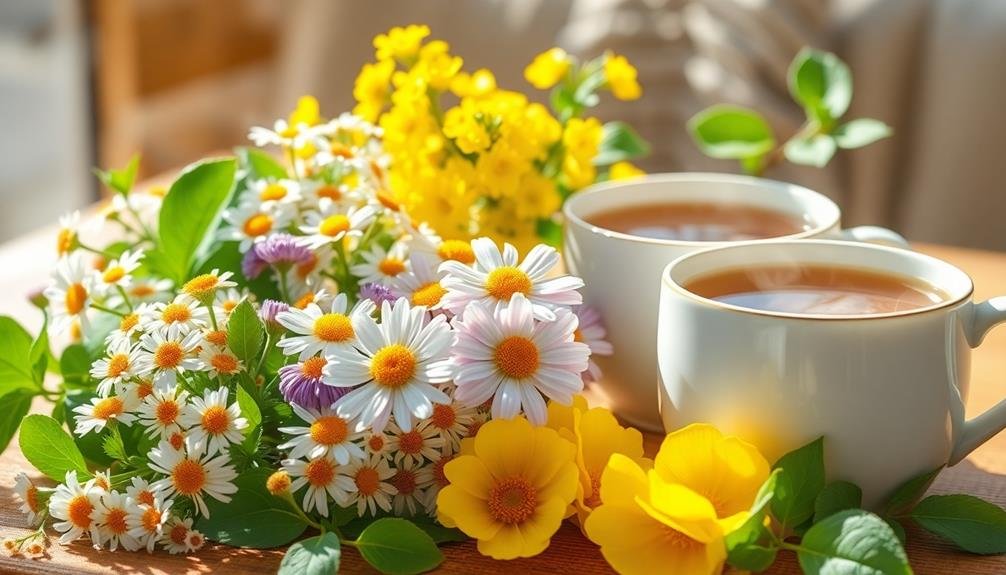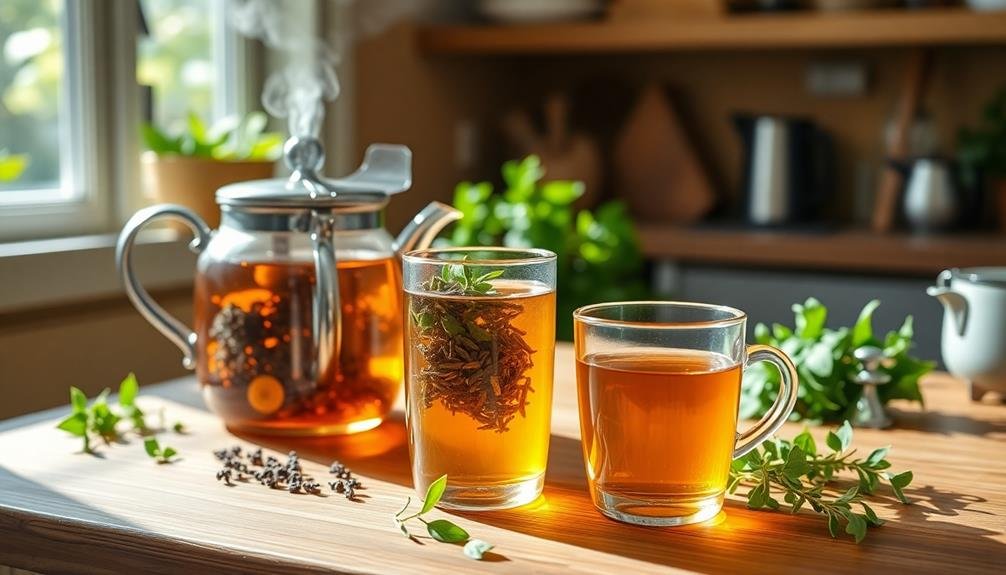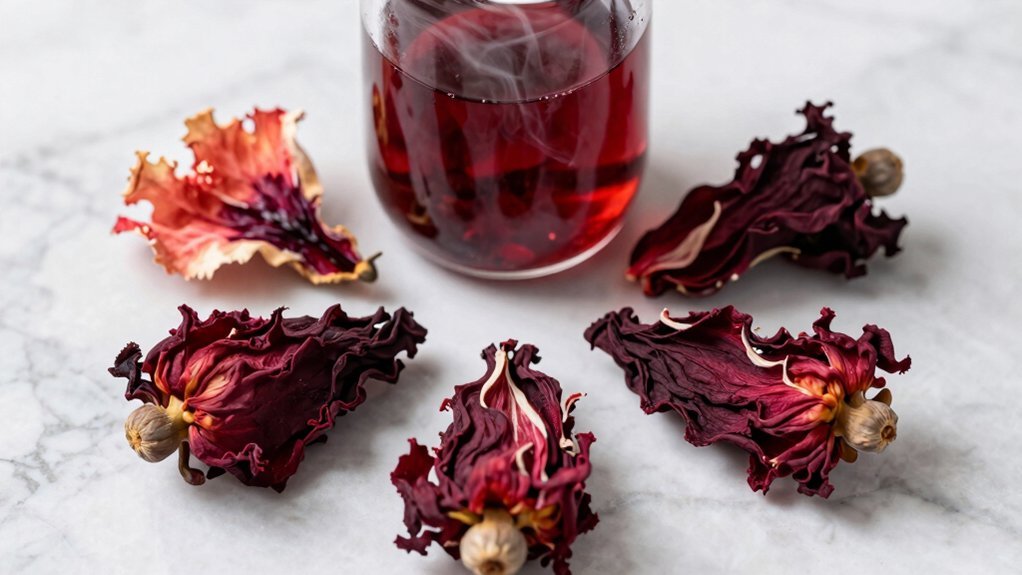Herbal teas can be great for combating Seasonal Affective Disorder (SAD). Chamomile relaxes you and improves sleep, while peppermint gives you an energy lift. Lemon balm uplifts your mood, and St. John's Wort may help alleviate depression symptoms by boosting serotonin levels. Ginger adds anti-inflammatory benefits and enhances overall happiness. Regularly enjoying these soothing brews not only promotes mindfulness but also helps manage stress. You can even create your own herbal blends for added benefits. If you want tips on specific recipes or brewing techniques, there's plenty more to discover.
Understanding Seasonal Affective Disorder

During the darker months of the year, many people experience Seasonal Affective Disorder (SAD), a type of depression that's linked to changes in seasons. If you find yourself feeling down during the fall and winter, you might be one of them.
SAD can cause symptoms like fatigue, irritability, and difficulty concentrating. You may also notice changes in your sleep patterns and appetite.
The exact cause of SAD isn't completely understood, but it's thought to be connected to reduced sunlight exposure. This lack of light can disrupt your body's internal clock and affect neurotransmitters like serotonin, which play a vital role in regulating mood.
If you're experiencing these symptoms, it's important to recognize that you're not alone, and there are ways to cope.
Understanding SAD is the first step toward managing it. Pay attention to how the seasons affect your mood and energy levels. Keeping a journal can help you identify patterns and triggers.
This awareness will empower you to seek support, whether that's through therapy, lifestyle changes, or exploring natural remedies.
Benefits of Herbal Tea
When you sip on herbal tea, you're not just enjoying a warm beverage; you're also tapping into natural mood enhancers that lift your spirits.
These teas can help relieve stress and support your immune system, making them a perfect companion during those gloomy months.
Let's explore how these benefits can play a crucial role in combating seasonal affective disorder.
Natural Mood Enhancers
Herbal teas can be a delightful way to lift your spirits and enhance your mood naturally. When you're feeling the weight of Seasonal Affective Disorder, sipping on these soothing brews can provide a comforting boost.
Certain herbs are known for their mood-enhancing properties, helping you feel more energized and positive.
Consider incorporating these herbal teas into your daily routine:
- Chamomile: Known for its calming effects, chamomile can help ease anxiety and promote relaxation.
- Peppermint: This invigorating herb can stimulate your senses and improve mental clarity, making you feel more alert and focused.
- Lemon Balm: A member of the mint family, lemon balm can uplift your mood and reduce feelings of stress.
Stress Relief Properties
Sipping herbal tea not only boosts your mood but also offers remarkable stress relief properties. When you're feeling overwhelmed, a warm cup of chamomile or lavender tea can work wonders. These herbs have calming effects that help reduce anxiety and promote relaxation, making it easier for you to unwind after a long day.
Valerian root is another excellent choice. Its natural sedative properties can help you manage stress more effectively, allowing you to sleep better at night. When you wake up revitalized, you'll find it easier to tackle the challenges of the day.
Peppermint tea is also worth considering. Its invigorating aroma can clear your mind and soothe your nerves, providing a mental break when you need it most. You'll often notice that taking just a few moments to enjoy a cup can greatly improve your mood.
Incorporating herbal teas into your daily routine can transform how you handle stress. By taking a moment to pause and sip, you're not only treating yourself to a delicious beverage but also giving your mind and body the care they deserve.
Embrace these calming brews, and feel the stress melt away.
Immune System Support
A warm cup of herbal tea can serve as a powerful ally for boosting your immune system. When you're battling the winter blues, sipping on certain herbal teas can help fortify your body against seasonal illnesses.
Many herbs are packed with antioxidants and nutrients that enhance your immune response, making it easier for you to stay healthy during the colder months.
Here are some herbal teas you might want to try:
- Echinacea: Known for its immune-boosting properties, this herb may shorten the duration of colds.
- Ginger: With its anti-inflammatory effects, ginger can help reduce symptoms of respiratory infections.
- Elderberry: Rich in vitamins A, B, and C, elderberry is celebrated for its ability to fight off flu and cold viruses.
Key Herbs for Mood Enhancement

When you're looking to boost your mood, certain herbs can make a real difference.
Chamomile offers calming effects, while St. John's Wort is known for its benefits against depression.
Don't forget about peppermint, which can provide that much-needed energy lift.
Chamomile's Calming Effects
Chamomile is one of the most popular herbs known for its calming effects, making it an excellent choice for those grappling with Seasonal Affective Disorder (SAD). This gentle herb can help you unwind, easing your mind during those darker months when you might feel more anxious or down.
Drinking chamomile tea can create a soothing ritual, giving you a moment to pause and relax.
Here are a few benefits of chamomile that can particularly help with SAD:
- Anxiety Reduction: Chamomile acts as a natural sedative, helping to reduce feelings of anxiety and promote a sense of tranquility.
- Improved Sleep Quality: Its mild sedative properties can improve your sleep, which is vital for combating the fatigue often associated with SAD.
- Digestive Aid: If stress leads to stomach issues, chamomile can soothe your digestive tract, helping you feel more comfortable overall.
Incorporating chamomile tea into your daily routine may not only enhance your mood but also provide a comforting ritual that supports your mental well-being during the tough winter months.
St. John's Wort Benefits
St. John's Wort is a powerful herb that can greatly boost your mood, especially during those darker months when Seasonal Affective Disorder (SAD) tends to strike. You might've heard of its reputation for helping alleviate symptoms of depression and anxiety. This is largely due to its active compounds, particularly hypericin and hyperforin, which work by increasing serotonin levels in the brain.
When you incorporate St. John's Wort into your routine, you may notice an improvement in your overall emotional well-being. It's often available in various forms, including teas, capsules, and tinctures, making it easy to find what suits you best. Drinking a warm cup of St. John's Wort tea can be a comforting ritual, especially on chilly days.
However, it's important to remember that this herb isn't a one-size-fits-all solution. You should consult with a healthcare professional before starting it, especially if you're on other medications, as St. John's Wort can interact with them.
Peppermint for Energy
Peppermint is one of the most invigorating herbs you can add to your routine for a quick energy boost. Whether you're feeling sluggish or just need a pick-me-up, a cup of peppermint tea can work wonders. Its revitalizing aroma and flavor stimulate your senses, helping to clear your mind and enhance your focus.
Here are a few reasons why peppermint can be a great addition to combat Seasonal Affective Disorder:
- Boosts Alertness: The menthol in peppermint stimulates the brain, making you feel more awake and alert.
- Enhances Mood: The invigorating scent can improve your mood, reducing feelings of anxiety and depression.
- Supports Digestion: A happy gut can lead to a happier mind, and peppermint aids in digestion, which can also impact your overall energy levels.
Incorporating peppermint tea into your daily routine can be a simple yet effective way to uplift your spirits.
Try sipping it in the morning to start your day or in the afternoon to recharge. You'll find that this vibrant herb not only boosts your energy but also improves your overall well-being.
DIY Herbal Tea Blends
Creating your own herbal tea blends can be a rewarding way to combat the symptoms of Seasonal Affective Disorder (SAD). When you mix various herbs, you not only create unique flavors but also harness different properties that support your mental well-being.
Start by selecting a base herb like chamomile for relaxation or lemon balm for its uplifting qualities.
Next, consider adding adaptogens such as ashwagandha or rhodiola, which help your body adapt to stress and boost mood. For a touch of sweetness, you can incorporate dried fruits like hibiscus or apple slices. If you're craving warmth, spices like ginger or cinnamon can enhance both flavor and health benefits.
Experiment with proportions until you find a blend that suits your palate. You might try starting with equal parts of your base and adaptogen, then adjust according to taste. Remember to jot down your recipes so you can recreate your favorites.
Once you've crafted your blend, steep it in hot water and enjoy the soothing effects. Customizing your herbal tea not only nourishes your body but also provides a comforting ritual that can help lift your spirits during those dreary months.
Brewing Techniques for Maximum Benefits

Once you've crafted your unique herbal tea blend, mastering the brewing process can greatly enhance its benefits. To reveal the full potential of your herbs, pay attention to the temperature, steeping time, and water quality.
Here are some essential techniques to keep in mind:
- Use Fresh Ingredients: Fresh herbs yield more flavor and nutrients than dried ones. If possible, pick them right before brewing.
- Temperature Matters: Different herbs require different temperatures. For most herbal teas, aim for boiling water (around 200°F or 93°C). However, delicate herbs like chamomile benefit from slightly cooler water (around 190°F or 88°C).
- Steeping Time: Allow your tea to steep for the right amount of time. Generally, 5 to 10 minutes works well for most herbal blends. If you steep too long, you might extract bitterness.
Lifestyle Tips for Managing SAD
When dealing with Seasonal Affective Disorder (SAD), incorporating certain lifestyle changes can greatly improve your mood and overall well-being.
Start by getting more sunlight; try to spend at least 20-30 minutes outside each day, especially in the morning. If natural light's hard to come by, consider a light therapy box to mimic sunlight exposure.
Next, prioritize physical activity. Regular exercise releases endorphins, which can elevate your mood. Aim for at least 30 minutes of moderate exercise most days, whether it's a brisk walk, yoga, or dancing.
Don't forget about your nutrition. Eating a balanced diet rich in omega-3 fatty acids, whole grains, and colorful fruits and vegetables can support brain health. Staying hydrated is just as essential, so drink plenty of water throughout the day.
Social connections play a significant role, too. Reach out to friends and family for support, and consider joining groups or clubs that interest you.
Finally, practice mindfulness or meditation techniques to reduce stress and enhance your emotional resilience.
Frequently Asked Questions
Can Herbal Teas Replace Medication for Seasonal Affective Disorder?
Herbal teas can complement your treatment for seasonal affective disorder, but they shouldn't replace medication. It's crucial to consult a healthcare professional to guarantee you're managing your symptoms effectively with the right approach.
How Often Should I Drink Herbal Tea for SAD Relief?
You should drink herbal tea daily for relief, ideally two to three times. Consistency helps boost your mood and overall well-being. Experiment with different blends to find what soothes you best during tough times.
Are There Any Side Effects From Herbal Teas?
Herbal teas can cause side effects like digestive issues or allergic reactions in some people. Always check the ingredients and consult a healthcare provider if you're unsure. It's best to listen to your body's responses.
Can I Combine Different Herbal Teas for Better Results?
Yes, you can combine different herbal teas for better results. Mixing them allows you to enjoy a wider range of flavors and benefits. Just make sure the herbs complement each other and suit your preferences.
Where Can I Purchase High-Quality Herbal Teas for Mood Enhancement?
You can purchase high-quality herbal teas for mood enhancement at specialty tea shops, health food stores, or online retailers. Look for brands that prioritize organic ingredients and positive customer reviews to guarantee you're getting the best quality.
In Summary
Incorporating herbal teas into your routine can be a simple yet effective way to combat seasonal affective disorder. By exploring key herbs and brewing your own blends, you can enhance your mood naturally. Remember to complement your tea with lifestyle changes, like spending time outdoors and staying active. With these strategies, you can brighten your days and lift your spirits, making the winter months a little more bearable. So, grab your favorite herbs and start brewing!





Leave a Reply